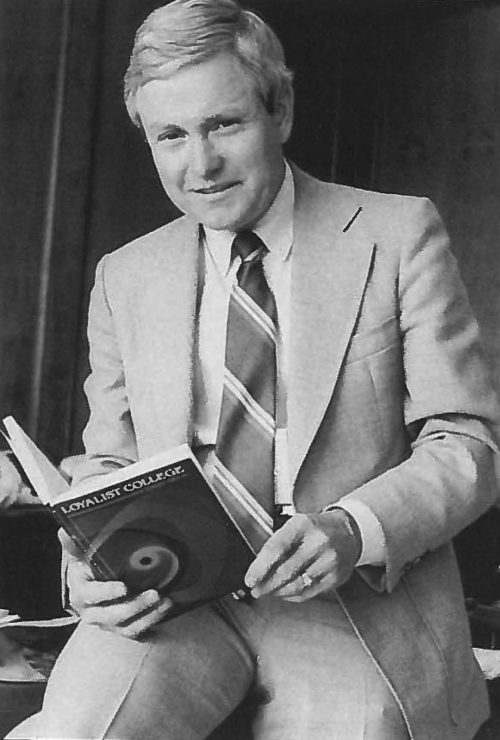Below is an excerpt from author Orland French’s book, PIONEERING: A History of Loyalist College (1992). While some references are no longer current, the publication provides a rich report on Loyalist’s history, which helps to contextualize its milestones. To read more from Mr. French’s book, please click here.
 Before his appointment to the President’s office, Dr. Douglas Auld served as Executive Dean and Principal of Sir Sandford Fleming’s School of Natural Resources.
Before his appointment to the President’s office, Dr. Douglas Auld served as Executive Dean and Principal of Sir Sandford Fleming’s School of Natural Resources.
Earlier, he had served as Chair of the University of Guelph’s Economics department.
Auld said he had been attracted by the College’s “outstanding reputation and its high-quality programs”.
He noted, however, that the College had to promote its value to the Quinte Region, and cautioned that all colleges would soon have to go through extensive changes to meet new social and economic demands.
Auld had challenged the conventional thinking of high school graduates who prefer university education to college training, re-emphasizing that colleges have to work harder to attract high school graduates, as well as establish their credentials with universities.
Echoing the observations of Herbert Young, Auld said, “It may mean that each college will have to do a better job of informing the public about all the good things that go on there and all the good prospects for young people in terms of an education.”
One of the President’s biggest public relations challenges was to convince local high school teachers, all whom had attended university, that colleges were useful learning institutions.
“Few, if any, had attended college and they really didn’t know what we were all about,” Auld said. “By bringing teachers to the College, Loyalist has been able to get its message across to the advisors and counsellors of young people in the 17 high schools within its area.”
In a turbulent job market where people no longer pursue one career for life, another role has emerged for colleges – one which was underestimated when they were established. Colleges have become centres for life-long learning. As well as providing alternative post-secondary education for high school graduates, increasingly colleges are helping adult learners, those over 25, to learn new skills.
“A college is a great empowerment institution,” Auld said in an interview. “It provides an avenue for people who have been out of school for a long time to learn new skills and get back into the workforce. You can’t do that easily at a university. Learning about learning, and rekindling an interest in learning, is almost as important as learning a new skill.”
Auld recalled the reaction of one student who was asked if he had enjoyed his course. The student replied that what he had enjoyed most was discovering that he liked to learn.
“If we can teach students to like learning, we’ve accomplished something,” said Auld.
The President of the College is also deeply concerned about the environment. Auld’s specialty in environmental economics has helped him to establish the Environment Studies Centre at the College.
Nature intrigues him. Auld’s third-floor office at the College overlooks the meadow and arboretum to the south, and sometimes he will interrupt a conversation to point out the features of a hawk soaring over the pines in the forest. With technical help from Sir Sandford Fleming’s School of Natural Resources in Lindsay, Loyalist’s old twin, Auld initiated the creation of an arboretum on campus. The arboretum was officially opened in September 1992.
To return to the History Timeline, click here.




